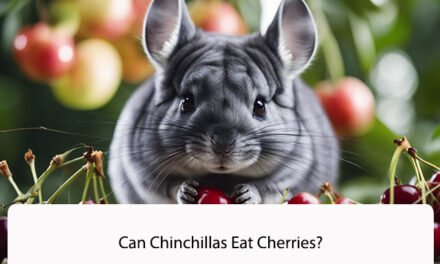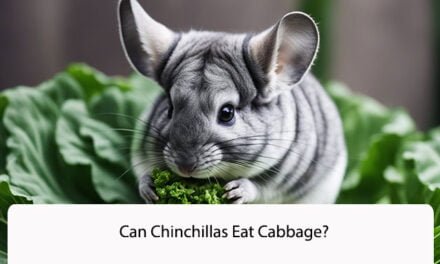Chinchillas are adorable and fluffy creatures that are loved by many as pets. They are herbivores and require a balanced diet to maintain their health. As chinchilla owners, we always want to ensure that our furry friends are getting the right kind of food. One question that often arises is whether chinchillas can eat dried cranberries.
Dried cranberries are a popular snack among humans and are commonly used in various recipes. However, when it comes to feeding them to chinchillas, it is essential to know whether they are safe or not. As responsible pet owners, we need to be aware of the potential risks and benefits of feeding our chinchillas certain foods. In this article, we will explore whether chinchillas can eat dried cranberries and what the potential risks and benefits are.
Before we dive into the topic, it is important to note that a chinchilla’s diet should consist mainly of hay, pellets, and fresh water. Treats such as fruits and vegetables should only be given in moderation. With that said, let’s take a closer look at whether chinchillas can safely consume dried cranberries and what nutritional value they offer.
Chinchilla Dietary Basics
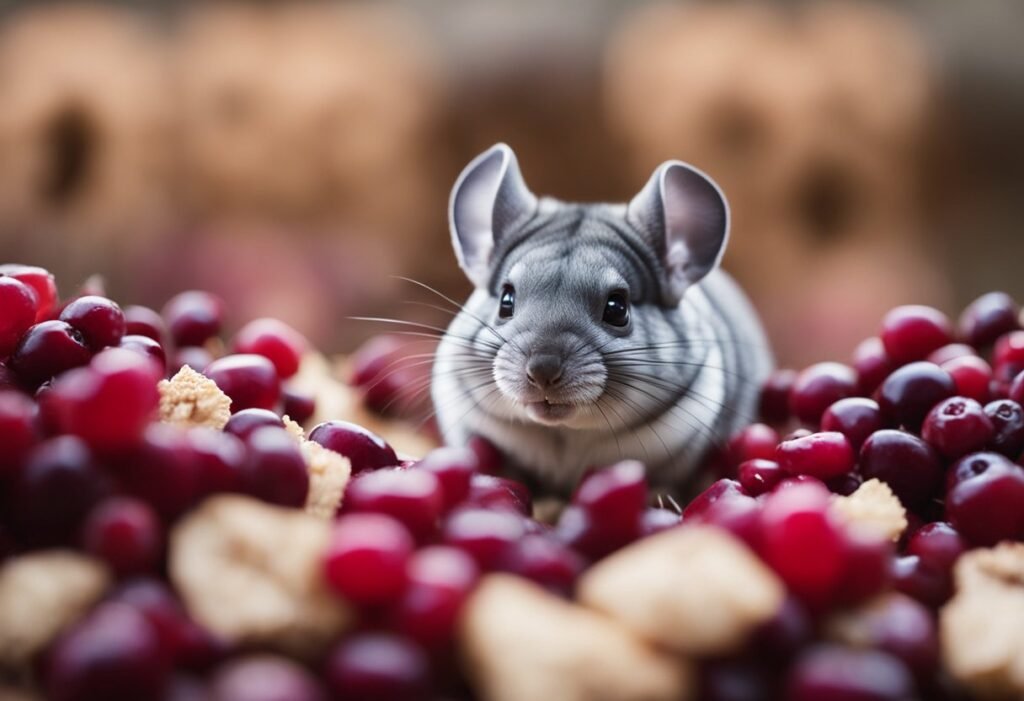
Understanding Chinchilla Nutrition
As responsible chinchilla owners, it’s important to understand the nutritional needs of our furry friends. Chinchillas are herbivores, which means they primarily eat plants. In the wild, chinchillas feed on a variety of grasses, shrubs, and herbs. In captivity, it’s important to mimic their natural diet as closely as possible.
Chinchillas require a diet that is high in fiber and low in fat. They also require a good source of vitamin C, as they are unable to produce it themselves. A lack of vitamin C can lead to serious health problems, including scurvy.
Safe Foods for Chinchillas
When it comes to feeding our chinchillas, it’s important to stick to safe foods. Some foods that are safe for humans can be harmful to chinchillas. For example, chinchillas should not be fed chocolate, caffeine, or alcohol.
In terms of fruits and vegetables, chinchillas can enjoy a variety of options in moderation. Some safe options include carrots, kale, and apple slices. However, it’s important to avoid feeding chinchillas dried fruits that are high in sugar, such as dried cranberries. These can lead to health problems, including obesity and dental issues.
In addition to fresh fruits and vegetables, chinchillas require a good quality hay and a small amount of pellets. It’s important to provide them with fresh water at all times.
By understanding the nutritional needs of our chinchillas and sticking to safe foods, we can help ensure that they live long and healthy lives.
Cranberries and Chinchillas
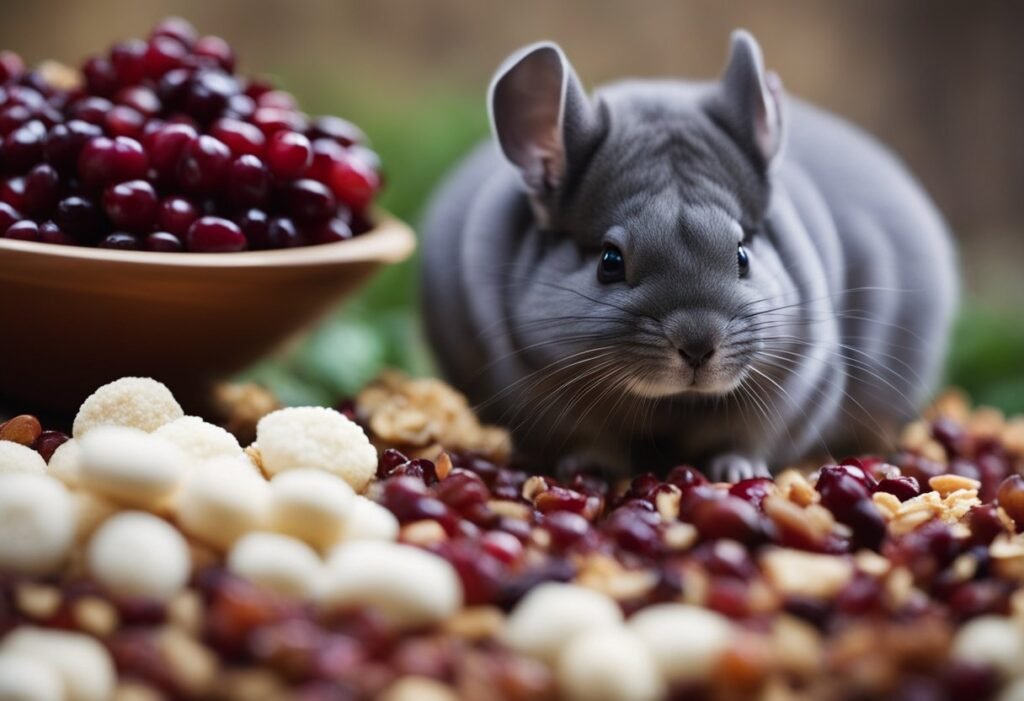
As chinchilla owners, we are always looking for new and healthy treats to give to our furry friends. One fruit that often comes to mind is cranberries. But can chinchillas eat dried cranberries? Let’s take a closer look.
Potential Benefits of Cranberries
Cranberries are a good source of vitamin C, fiber, and antioxidants. Vitamin C is essential for chinchillas as they cannot produce it themselves. Fiber is important for maintaining healthy digestion, and antioxidants can help protect against cell damage.
Risks of Feeding Cranberries to Chinchillas
While cranberries do have some potential benefits, they also have some risks when it comes to feeding them to chinchillas. Cranberries are high in sugar and can cause digestive upset if given in large amounts. They can also lead to obesity and dental issues if given too often.
In addition, many dried cranberries are coated in sugar or other sweeteners, which can be harmful to chinchillas. It’s important to read the ingredient list carefully before giving any treats to your chinchilla.
Overall, while cranberries do have some potential benefits, it’s best to give them to your chinchilla in moderation and as part of a varied diet. Stick to plain, unsweetened cranberries and only give them as an occasional treat. As always, if you have any concerns or questions about your chinchilla’s diet, consult with a veterinarian.
Dried Cranberries as a Treat
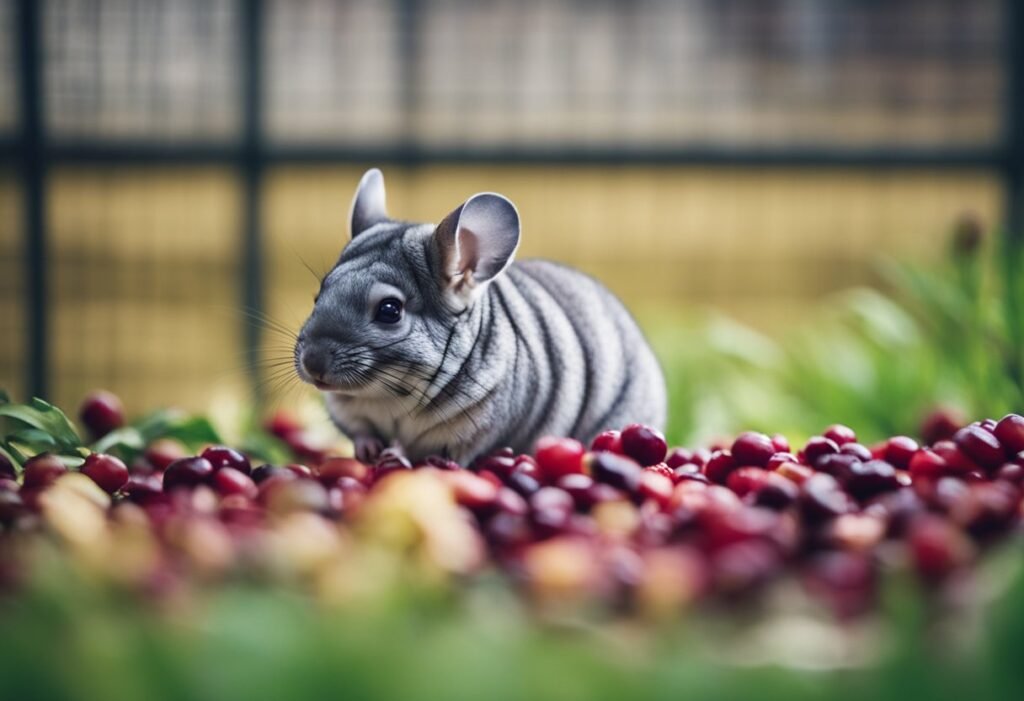
Dried cranberries are a popular snack among humans, and it’s natural to wonder if your chinchilla can enjoy them too. While chinchillas have specific dietary requirements, dried cranberries can be a suitable treat for them in moderation.
Sugar Content in Dried Cranberries
Dried cranberries are high in sugar content, which can be harmful to chinchillas if consumed in large quantities. As such, it’s important to limit the amount of dried cranberries given to your chinchilla. A 1/4 cup serving of dried cranberries contains approximately 29 grams of sugar, which is more than the recommended daily intake for chinchillas.
Appropriate Serving Size
The appropriate serving size of dried cranberries for chinchillas is 1-2 pieces per week. It’s important to note that dried cranberries should not replace your chinchilla’s regular diet, which should consist mainly of hay, pellets, and fresh water.
When offering dried cranberries to your chinchilla, it’s important to ensure they are free of any added sugars or preservatives. Look for unsweetened, all-natural dried cranberries to ensure your chinchilla is getting a healthy treat.
In conclusion, dried cranberries can be a tasty treat for your chinchilla when given in moderation. Be sure to limit the amount given and choose all-natural, unsweetened options to ensure your chinchilla is getting a healthy snack.
Introducing New Foods to Chinchillas
As chinchillas are herbivores, it is important to introduce new foods to their diet gradually to avoid upsetting their digestive system. When introducing dried cranberries to your chinchilla’s diet, it is important to follow a few guidelines to ensure their health and well-being.
How to Introduce Dried Cranberries

Firstly, it is important to note that dried cranberries should only be given to chinchillas as an occasional treat, as they are high in sugar and can cause digestive issues if over-consumed.
To introduce dried cranberries to your chinchilla’s diet, start by offering a small amount, such as one or two pieces. Observe your chinchilla’s reaction and monitor their stool for any changes. If your chinchilla tolerates the dried cranberries well, you can gradually increase the amount over time.
It is important to note that dried cranberries should never replace your chinchilla’s regular diet of hay, pellets, and fresh vegetables. These foods provide essential nutrients and fiber that your chinchilla needs to maintain good health.
Monitoring Your Chinchilla’s Health
When introducing any new food to your chinchilla’s diet, it is important to monitor their health closely. Keep an eye on their stool, appetite, and behavior to ensure that they are not experiencing any negative effects from the new food.
If you notice any changes in your chinchilla’s health, such as diarrhea, lethargy, or loss of appetite, stop feeding them the new food immediately and consult with a veterinarian.
In conclusion, introducing new foods to your chinchilla’s diet can be a fun way to provide them with variety and enrichment. However, it is important to do so gradually and with caution to avoid any negative effects on their health.
Alternatives to Dried Cranberries
If you’re looking for alternative treats to offer your chinchilla, there are plenty of options to choose from. Here are a few suggestions:
Healthier Treat Options
- Hay Cubes: These are made from compressed hay and come in a variety of flavors. They’re a great way to offer your chinchilla a treat that’s both tasty and healthy.
- Fresh Vegetables: Many vegetables are safe for chinchillas to eat, including carrots, bell peppers, and kale. Just be sure to offer them in moderation, as too much can upset your chinchilla’s digestive system.
- Dried Rose Hips: These are a great source of vitamin C and other nutrients. They’re also low in sugar, making them a healthier option than dried fruits like cranberries.
Foods to Avoid
- Nuts and Seeds: While these may seem like a healthy treat option, they’re actually high in fat and can be difficult for chinchillas to digest.
- Processed Treats: Many commercial treats marketed for chinchillas are high in sugar and other unhealthy ingredients. It’s best to stick with natural, whole foods whenever possible.
- Fruits High in Sugar: While some fruits are safe for chinchillas to eat, those that are high in sugar (like dried cranberries) should be avoided. Too much sugar can lead to digestive problems and other health issues.
Frequently Asked Questions
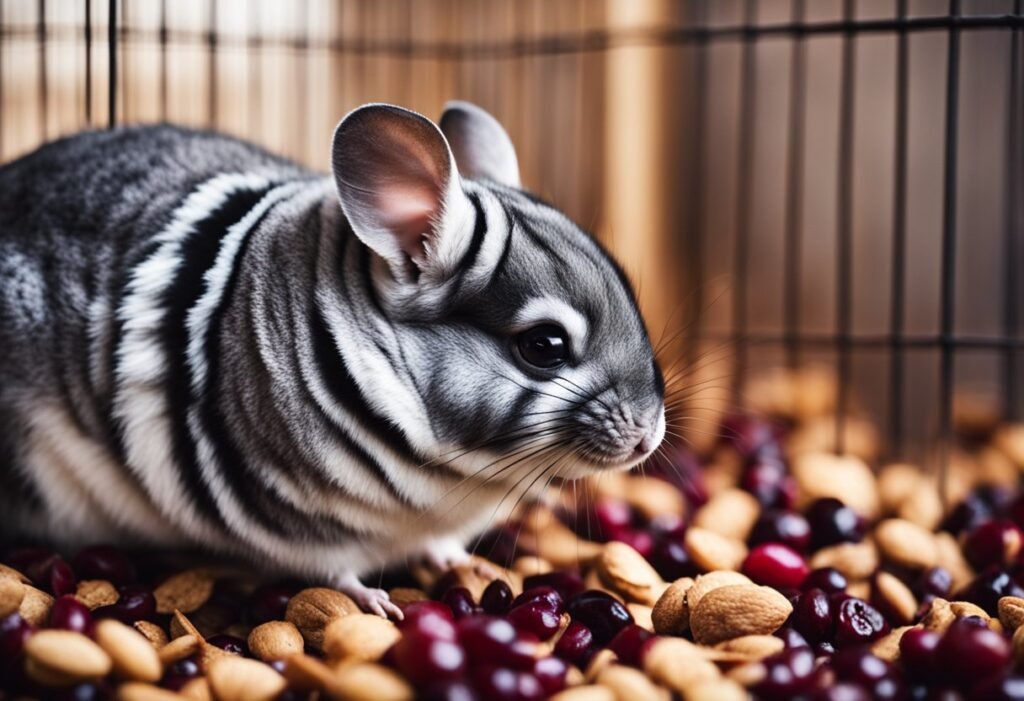
What fruits are safe for chinchillas to consume?
Chinchillas can safely consume a variety of fruits, including apples, bananas, and grapes. However, it’s important to remember that fruits should only make up a small portion of a chinchilla’s diet as they are high in sugar and can cause digestive issues if overconsumed.
Are dried fruits a healthy treat option for chinchillas?
While dried fruits may seem like a healthy treat option, they should be avoided for chinchillas. Dried fruits are high in sugar and preservatives, which can be harmful to a chinchilla’s digestive system.
Which vegetables are recommended for a chinchilla’s diet?
Chinchillas can safely consume a variety of vegetables, including carrots, celery, and kale. It’s important to introduce new vegetables slowly to avoid digestive upset and to ensure that they don’t make up too large a portion of a chinchilla’s diet.
What are some toxic foods to avoid feeding chinchillas?
Chinchillas should never be fed chocolate, caffeine, or alcohol as they can be toxic to their system. Additionally, any food high in sugar or fat should be avoided as it can cause digestive issues.
Can chinchillas have berries, and if so, which kinds?
Chinchillas can safely consume some types of berries, including strawberries and raspberries. However, it’s important to remember that fruits should only make up a small portion of a chinchilla’s diet.
How can one prepare homemade treats that are safe for chinchillas?
Homemade treats can be a great way to provide chinchillas with a healthy and safe snack. Some options include dried rosehips or apple slices. It’s important to avoid using any ingredients that are high in sugar or fat and to introduce new treats slowly to avoid digestive upset.



